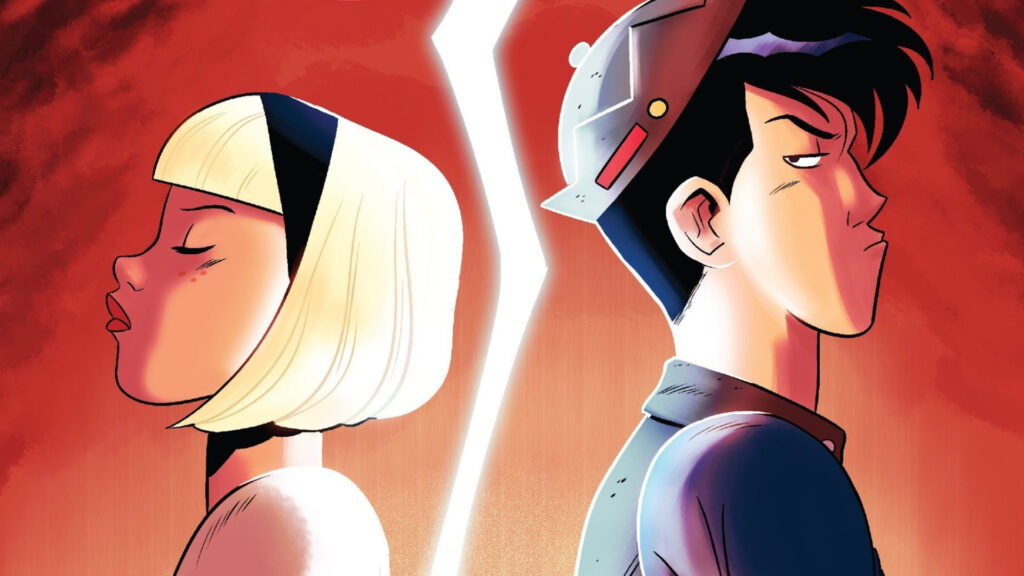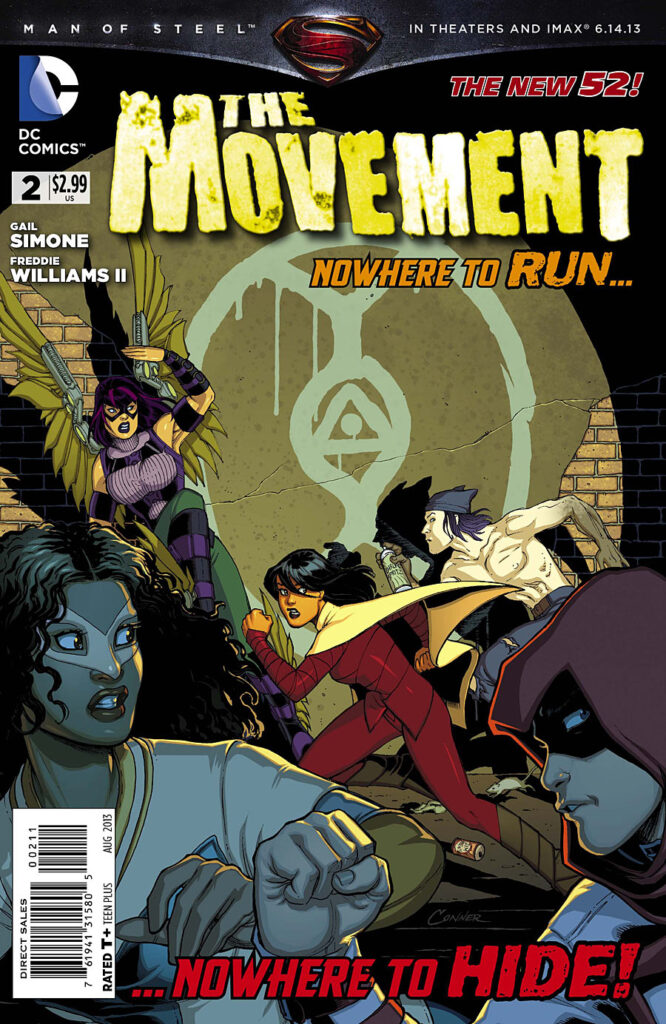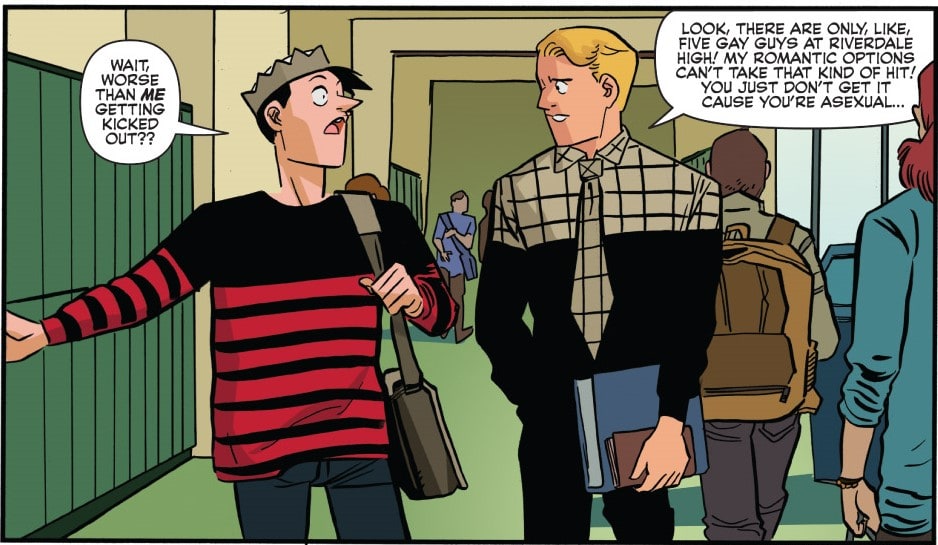
Comics Corner – On the Absence of Asexuality
While matters of LGBTQ+ representation in comics are broadly improving, there’s one group that continues to be overlooked – asexuals.
While there are notable efforts for inclusion in indie titles (such as Alix in Sex Criminals) and webcomics, asexual – or ace – representation is nigh on non-existent from mainstream publishers. In recent years, only two stand out: Tremor, a DC character who sometimes walks the line between hero and villain, and Forsythe Pendleton “Jughead” Jones, the best friend to Archie Andrews in various Archie Comics series.

Tremor is the codename of Roshanna Chatterji, who first appeared in Secret Six #25 in 2010. Created by writer Gail Simone and artist Jim Calafiore, Roshanna – as her secret identity suggests – has seismic and vibration based powers, allowing her to shake anything from her enemies to the ground itself to pieces. As she originally appeared, she was an adult, working for a mysterious background figure called Mockingbird and charged with recruiting the eponymous Six for a specific mission.
In this series, Tremor didn’t seem to be explicitly asexual. In Secret Six #26, she is distracted by a nearly-naked Catman, calling him “hot” as he dives into a lake. However, she also repeatedly expresses an intense dislike of being touched by anyone. Aside from one storyarc in the title though, Tremor didn’t appear again before being rebooted – along with the entire DC Universe – as part of the publisher’s line-wide New 52 initiative.
Reappearing in 2013 in another Gail Simone written title, The Movement – a super-powered underground protest group very loosely inspired by the real-world Occupy movement, dedicated to overturning corruption in the fictional Coral City – this version of Tremor appeared slightly younger than the one in Secret Six. Here, Simone, along with artist Freddie E. Williams II, had more space over the series’ twelve issues to explore Roshanna’s background, establishing her as an Indian immigrant to the US, and slowly building up the reveal of the character’s sexuality.

In The Movement #10, Tremor has to confront her teammate Mouse over his interest in her. After dodging his occasional affections over the course of the series, Roshanna sets him down and explains that they wouldn’t work as a couple – not because Mouse is a sewer dweller with the ability to talk to and control rats, but because she is asexual (possibly a bullet dodged anyway).
Unfortunately, that was about as much exploration of Tremor’s sexuality as readers got. The Movement was cancelled with issue 12, and – apart from a single panel appearance in Batgirl #34, the team haven’t appeared since. There’s no way of knowing how Tremor would have grown and developed had The Movement continued, or how her asexuality would have been further explored.
Jughead’s asexuality is a more storied affair. First appearing in Pep Comics #22 way back in 1941, he was the best friend of Archie, frequently caught up in his comedic capers. Where Archie was constantly getting into romantic strife, Jughead was utterly disinterested in girls as a deliberate contrast. Over the decades, various reasons for this were given, from him preferring to spend money on burgers than dates, to having an early heartbreak that put him off romance, to claiming girls were “despicable” because of the strife he saw Archie go through. However, Jughead’s disinterest was almost always in service of jokes. His lack of interest often backfired too, attracting women instead of deterring them, much to his chagrin.

It wasn’t until 2016 when Jughead being Ace was codified into a distinct orientation. In Jughead #4, by writer Chip Zdarsky and artist Erica Henderson, his asexuality is confirmed in a conversation with Kevin Keller – incidentally, Archie Comics’ first gay character, introduced in 2010. It’s a lighthearted, joyful exchange, with Jughead saying that not being “hobbled by hormonal impulses” is what makes him the only person not distracted enough to spot an attempt by nefarious forces to take over the school.
Unlike Tremor, Jughead’s asexuality becomes a fairly prominent aspect of the character for the remainder of the series. In #10, writer Ryan North and artist Derek Charm even explore ace dating, with Jughead caught on a date with Sabrina the Teenage Witch, stuck for words on how to explain he’s asexual. It’s a genuinely funny issue, not just for the awkwardness, but for Jughead’s increasingly bizarre efforts to get out of the date, culminating in an even stranger prank war between the two – a great way to show that removing romantic or sexual tension doesn’t mean characters or stories have to be boring.

Unfortunately, the presumption that said tension is integral to making stories interesting – particularly serial storytelling, as most comics are – is part of the reason why asexual visibility remains so poor. A significant amount of narrative in all media is centred on sex and relationships – from “will they, won’t they?” pairings to love triangles, unrequited loves, and even purely carnal pursuits. Sex, as is so often said, sells, and removing even the possibility of sex and romantic relationships from a character’s potential trajectory often means no-one is buying, confining them to background status at best.
This is even more prominent the ongoing soap opera that is superhero comics, where romantic dalliances – Superman and Lois Lane, Spider-Man and Mary Jane, Apollo and Midnighter, and countless more – are often core parts of the mythos. Take out the love interest to occasionally imperil, and where’s the drama?
Even in humour comics, Archie has spent literally eighty years remixing stories of whether Archie will choose Betty or Veronica, making romance central to the concept. That extended so far that in the TV series Riverdale, loosely adapted from the Archie comics, Jughead’s asexuality is gone. Instead, he’s another horny teenager in a show full of horny teenagers, eventually in a heterosexual relationship with Betty.
Hopefully, the mid-2010s window that gave Ace readers Tremor and an openly Ace Jughead wasn’t just a blip, and that moves to more accurately portray this often overlooked section of the LGBTQ+ community will continue. For that to happen though, publishers and creators will need to learn that romantic or sexual drama doesn’t have to be a requirement to craft entertaining and engaging stories.
Sadly, with no sign of Tremor since 2014, no other asexual characters at DC or Marvel, and Archie Comics having – for the time being – seemingly reverted to traditional humour comics rather than the slightly more modern, mature takes that brought us asexual Jughead, Ace readers may be waiting a while.





